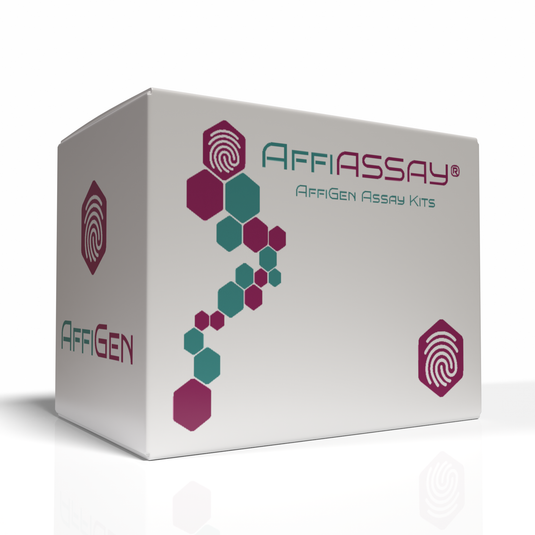AffiASSAY® MTS Cell Proliferation Colorimetric Assay Kit
AffiASSAY® MTS Cell Proliferation Colorimetric Assay Kit is designed to provide accurate and reliable measurements of cell proliferation in various biological samples. This assay kit offers a robust tool for researchers in the fields of cell biology, pharmacology, and drug discovery.
Key Features:
- High Sensitivity: Our assay kit is optimized to detect subtle changes in cell proliferation, enabling precise quantification across a wide range of conditions.
- Colorimetric Detection: Leveraging the colorimetric assay principle, our kit ensures reproducible results with minimal background interference, enhancing assay reliability.
- Versatile Application: The AffiASSAY® MTS Cell Proliferation Colorimetric Assay Kit is compatible with diverse cell types and culture conditions, facilitating broad experimental applicability.
- Straightforward Protocol: With a user-friendly protocol, you can obtain proliferation data efficiently, saving time and resources in your research endeavors.
- Reliable Performance: Whether assessing compound cytotoxicity, screening for proliferation modulators, or studying cellular responses, our kit delivers consistent and dependable results.
Assay Principle:
This assay kit utilizes the reduction of the yellow tetrazolium salt MTS (3-(4,5-dimethylthiazol-2-yl)-5-(3-carboxymethoxyphenyl)-2-(4-sulfophenyl)-2H-tetrazolium) to formazan by metabolically active cells. The formazan product's absorbance is proportional to the number of viable proliferating cells in the sample, allowing accurate quantification of cell proliferation.
Applications:
- Cell Viability Assessment: Evaluate the viability and proliferation potential of cultured cells under different experimental conditions.
- Drug Screening: Screen compounds for their effects on cell proliferation, aiding in the identification of potential therapeutic agents.
- Proliferation Assays: Study cellular proliferation dynamics in response to stimuli, treatments, or genetic manipulations with precision.
- Cellular Toxicity Testing: Assess the cytotoxicity of chemicals, drugs, or environmental factors on cell growth and proliferation.
Kit Contents:
- MTS Reagent
- Cell Culture Medium
- Stop Solution
- 96-Well Assay Plate
- Detailed Protocol
Why Choose AffiASSAY®?
Our dedication to scientific excellence and quality assurance makes AffiASSAY® the preferred choice for researchers worldwide. We are committed to providing innovative solutions that empower your research and accelerate scientific discoveries.
AffiASSAY® MTS Cell Proliferation Colorimetric Assay Kit Protocol:
[Please note that this protocol serves as a general guideline. Always refer to the specific instructions provided in the kit manual for precise details.]
Materials Needed:
- AffiASSAY® MTS Cell Proliferation Colorimetric Assay Kit
- Cultured cells or tissue samples
- Cell culture plates or vessels
- 37°C CO2 incubator
- Microplate reader capable of measuring absorbance at ~490 nm
- Pipettes and tips
Protocol:
Cell Preparation:
- Culture cells according to standard protocols until reaching the desired confluence or experimental stage.
- Harvest cells using trypsin or a suitable cell dissociation reagent and resuspend them in fresh culture medium.
- Adjust cell density as needed for the assay.
Assay Plate Setup:
- Seed cells in a 96-well plate at appropriate densities, ensuring uniform distribution across wells.
- Include wells for blank controls (medium only) and positive controls (untreated cells) as references.
MTS Assay:
- Prepare the MTS reagent according to the kit instructions.
- Add an appropriate volume of MTS reagent to each well containing cells.
- Incubate the plate at 37°C in a CO2 incubator for a specified duration, typically 1-4 hours.
- After incubation, stop the reaction by adding the provided stop solution.
Optical Density Measurement:
- Measure the absorbance of the formazan product at around 490 nm using a microplate reader.
Data Analysis:
- Calculate cell proliferation or viability based on the absorbance readings, comparing experimental wells to controls.
- Plot data and analyze results according to your research objectives.
Results Interpretation:
- Interpret assay results in the context of your experimental conditions and hypotheses.
- Consider factors such as treatment effects, time course, and replicates in result interpretation.
Data Presentation:
- Prepare figures or tables summarizing your findings for presentation or publication.
- Include statistical analyses if applicable to enhance result credibility.
Cleanup:
- Dispose of all waste materials properly, following institutional guidelines for biohazardous waste.
- Ensure proper storage and labeling of remaining kit components for future use.

